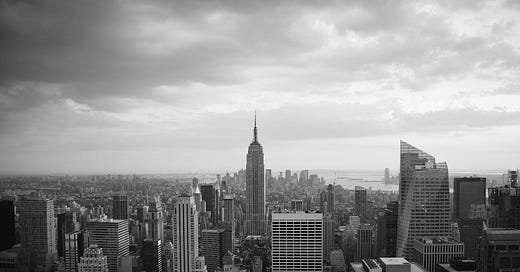Among my jobs for Columbia Law was covering endless dinners, soirees, and galas—often several a week—thrown at fancy midtown venues by various firms, societies, and journals. I’d wear a tie and write up nights as major social and intellectual happenings, attended by everybody who was anybody, mainly to accompany our expensive photographers’ glamour shots.
Beyond flattering students, alums, and donors, I had to demonstrate that the school’s Office of Communications and Public Affairs was proactively on top of things. As such I’d arrive early to shake hands with VIPs and then, as guests drifted in, discretely down as much as I could from the open bar. I told myself it was to help break the ice, but it was more that most of the events were so damn depressing; the lawyers and law students I hobnobbed with drank even more, as their 80-hour weeks poring over footnotes were even worse.
Any gathering far enough from identity politics, like intellectual property or fine points of mergers and acquisitions, could be fascinating—top minds breaking down ambiguities of case law and pending litigation. But areas easier to politicize, and particularly events co-hosted by the Office of Social Justice Initiatives, were almost guaranteed to be tiresome slogs: even before the utopian self-promoters I was paid to lionize were zealous students and alums sloppily happy to tell a reporter what they really thought.
(It helped that I seemed like one of them; going to law school had been my backup plan if journalism didn’t pan out. Were I not hired on by Columbia a few years earlier I may well have been sitting beside them in class or court.)
Again and again I’d hear how we—the global meritocracy—would’ve solved poverty and inequality and climate change long before if not for evil saboteurs. We were enlightened administrators of the rational future, civilizing braying savages for their own good. Feelings in our collective gut amounted to the sum of human wisdom: we’d read the New York Times and realize of course we’d always known.
Amongst an increasingly international crowd, Americans tended to be intensely jealous of peers from the European Union and especially China, where elite experts had more latitude to dispense with troublemakers. Due to stupid separation of powers in our obsolete constitution we in the U.S. were prevented from fixing things by neo-Nazis out in flyover country.
But thankfully loads of old white racists were dying off each day, and righteous new immigrants arriving, so it wouldn’t be long before global citizens like us would take charge—and woe to the wicked! Vengeance would be sweet: oh, how the pigs would squeal as we finally forced social and historical and cosmic justice. The louder they bitched and moaned, the better a job we’d know we were doing.
Far from advising indiscreet hotheads to tone it down, older lawyers, law professors and even judges were expressly envious of the next generation’s willingness to tell it like it was—these truths that everybody who was anybody already knew. They’d gush about our vision and passion, and wish they were our age.
After an hour the help would come seat us, replacing whiskeys with wine, and blustering would continue over bread and butter until formal spiels began. I’d take notes on professors’ remarks as salads and entrees were served—generally lukewarm salmon in rented rooms at the Princeton Club, or occasionally steaks at the 21 Club for better-subsidized events.
Before dessert came keynote speakers, typically sharp-elbowed New York politicos and once even Barack’s Solicitor General of the United States. We were the spiritual and intellectual vanguard, they’d always suggest—undersung heroes safeguarding societal sanity. So vast was the right-wing conspiracy, so rife the disinformation, that extraordinary measures were required to protect our democracy from the masses.
Evenings waned over coffee and cheesecake with selfies and business cards. After a few final group photos, most drifted out the door ever more secure in their convictions. In the morning, hungover, I’d squint at my notes to extract and burnish the most quotable bits, and consult with colleagues on the most flattering (or least unflattering) photo selects. In between covering lunchtime talks and pitching faculty scholarship, I’d spend my afternoons honing stories and tinkering in Photoshop to soften blemishes, whiten teeth, and stretch images a few percent to make everyone taller and thinner.
By the time drafts passed muster with my editors they’d become smooth little concoctions perfect for fundraising—not quite what I’d intended, still trying on some level to practice journalism, but impressive enough for what they were. My problem was ambivalence turning to guilt: day by day I was making gleefully autocratic ideologues look reasonable, generating slick PR idealizing what they really thought. Over time it became more than my conscience could sustain.
Next: The Grammys of Journalism


